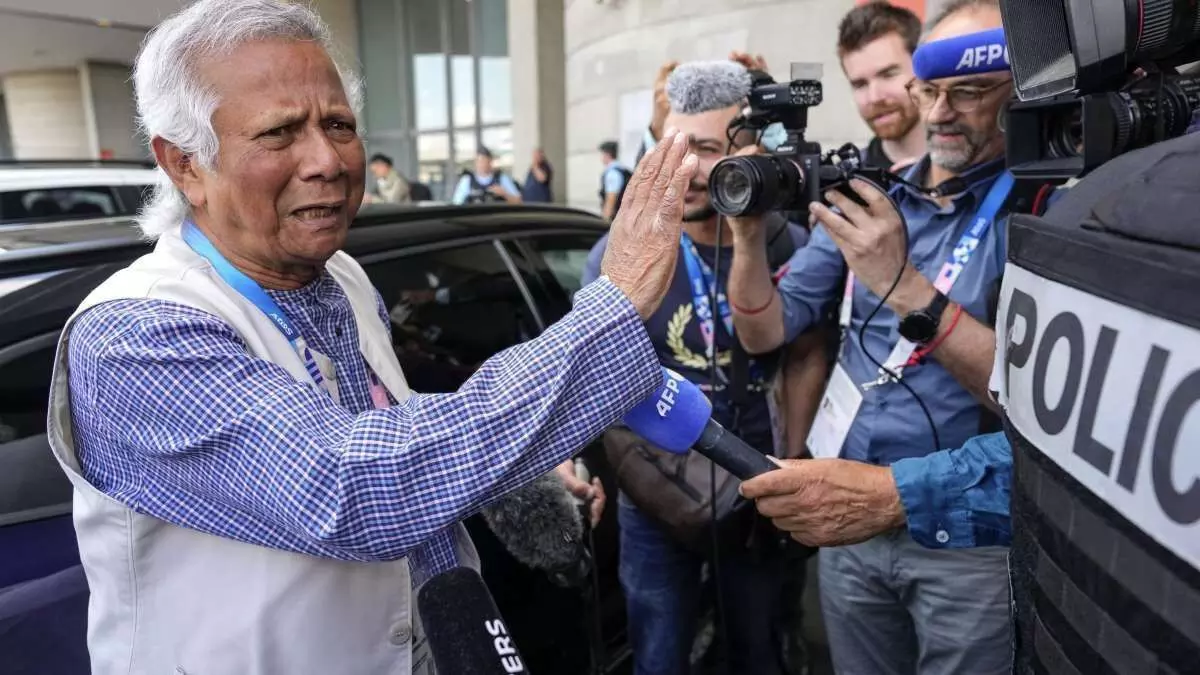Shifting sands
As Bangladesh strives to emerge from a turbulent law-and-order situation, new geopolitical realities may be in the offing, where India could seek a favourable balance

Bangladesh is still struggling to restore law and order or bring some semblance of governance. A high-profile set of advisors has not yet come to any positive notice or been seen to be doing anything that would instill confidence in the public at large. There is only high-voltage rhetoric with almost hollow content, ostensibly for public consumption, and nothing substantial is yet visible.
Disturbingly, Wahabi hardliners are continuing their acts of thoughtless destruction of Sufi and Shia shrines in many parts of the country, while law enforcement agencies watch as mute spectators. Video recordings show the desecration of places of reverence of other faiths.
Dhaka University, once renowned for its academic brilliance, churning out some of the finest brains on both sides of Bengal, now seems to be under the control of elements with jihadi inclinations, and utter lawlessness prevails on the campus. Very recently, a mentally challenged young man was first videotaped while eating and then brutally murdered on the university premises. It was unthinkable in the recent past that such mindless and grotesque acts could occur in this famous centre of learning. It looks to be a free for all. The army has been empowered with magisterial powers for six months and, in reality, the police is completely passive, yet there are no signs within the government to ensure that the law-and-order situation remains sound, and for the confidence of the general people, law and order machinery at least looks effective and deterrent. However, that appears far from being happening.
Moreover, Jamaat-influenced forces have started discussing the tampering of the academic curriculum. Some veterans in the academic community say the university has now become an enlarged version of regressive madrassas. There are no indications from any administrative quarters that there is a move to control this disturbing trend, which seems to be assuming perilous proportions.
Meanwhile, Durga Puja worshippers still feel insecure in the absence of any meaningful assurances of safety from the authorities. The annual Puja is only a week or ten days away, and provocative statements from hardliners continue to pour in. Hindus are, therefore, in a state of extreme uncertainty and insecurity.
In the meantime, a US delegation, led by Brent Neiman, Assistant Secretary of State for International Finance at the US Department of Treasury, and accompanied by Donald Lu, a key State Department official, along with other members of USAID and the Trade Department, visited Dhaka. This is the first significant US delegation to visit Dhaka in many years. The Bangladesh side was led by the Advisor on Financial Affairs, Salehuddin Ahmed, Bangladesh Bank Governor Ahsan Mansur, the Foreign Secretary, and other senior officials. Talks between the two sides focused on economic growth, institution-building, and development projects to benefit the people. It is believed the US team has assured development support of up to 200 million US dollars. The Bangladesh government is heaving a sigh of relief after this visit, raising hopes that US financial assistance and related help will continue, enabling Bangladesh to overcome its financial challenges.
Meanwhile, on the sidelines of the US delegation's Dhaka visit, it is abuzz that the US is covertly trying to ensure regime change in neighbouring Myanmar, so that more than a million Rohingya refugees currently sheltered in Bangladesh could be repatriated, bringing much-needed financial relief to Bangladesh's exchequer. This plan seems distant but could possibly be in the pipeline.
In another development from the Bangladesh point of view, Chief Advisor Muhammad Yunus is slated to meet US President Joe Biden on the sidelines of their summit at the UN. It is the first time in 30 years that a Bangladesh Head of State is meeting his US counterpart. Analysing these developments, it is evident that there is a fresh opening in US-Bangladesh relations, and the thaw and bonhomie are likely to continue.
On the other hand, not to lag behind in diplomacy after Sheikh Hasina's ouster, the Chinese government has dispatched a team of highly specialised medical professionals to Dhaka to treat students injured in the July uprising. This seems to be an extraordinary gesture by China to the current Bangladesh regime, keeping them in good humour as Bangladesh is now clearly under US influence.
Simultaneously, in another political development, the Secretary General of the Bangladesh Nationalist Party (BNP), Mirza Fakhrul Islam Alamgir, disclosed to the press about his party’s meeting with the Indian High Commissioner at the BNP office in Dhaka on September 22. He was not averse in his reaction to the meeting, but it appears that the BNP is trying to open a channel with India. This could still be at a nascent stage, but efforts are ongoing. Additionally, the party chairman, Tanique Rahman, who lives in London, recently made a bold statement assuring the Hindu minority in Bangladesh of their security, also stating that the country belongs as much to Hindus as to Muslims. Analysing these two developments, it is increasingly clear that the BNP is trying to reach out to both Hindus and India, amid reports of a steady distancing between the party and its erstwhile partner, Jamaat-e-Islami (JeI), which governed in coalition from 1991 to 1996 and then from 2001 to 2006. This is an interesting development, as it suggests that the BNP, with elections in mind, may be planning to occupy the political vacuum caused by the exit of Sheikh Hasina and the Awami League (AL) from the political scene. Hence, the upcoming political developments in the turbulent state could be exciting and worth watching.
The writer is a retired IPS officer, Adviser NatStrat, and a former National Security Advisor in Mauritius. Views expressed are personal



